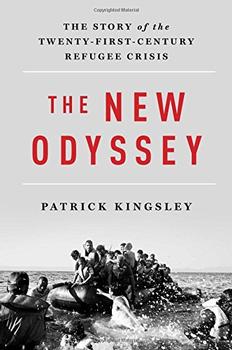Summary | Excerpt | Reviews | Beyond the Book | Readalikes | Genres & Themes | Author Bio

The Story of the Twenty-First Century Refugee Crisis
by Patrick Kingsley
The rise of Donald Trump created a toxic environment in which the Obama administration – which had itself deported more immigrants than any other US administration in history – became increasingly reluctant to open the doors to Syrians. Trump threatened to build a wall along America's border with Mexico, and then said Muslims would be banned from entering the country under his putative presidency. Citing security fears, Congress voted to suspend resettlement of Syrian refugees – even though successful applicants had already been screened by no fewer than four US government departments, making them the most rigorously vetted immigrants in the world. Thirty-one governors said they would try to veto attempts to house Syrians in their state – and the upshot was that Canada ended up promising to resettle 250 per cent more Syrian refugees than their wealthier and larger neighbour to the south.
This failure of American leadership contributed to the passage of refugees to Europe instead. Hashem al-Souki, the Syrian we met earlier at sea, wouldn't have attempted such a journey had he not lost hope in being formally resettled in America. After we became friends, I happened to visit Ellis Island and sent Hashem a picture of the Statue of Liberty. I explained the history of the island and how the ancestors of 100 million Americans once passed through there. I told him about the inscription beneath the statue, which promises to welcome the world's "huddled masses".
"Can I come?" Hashem asked. He soon got the irony.
Unable to reach Ellis Island's modern-day equivalents, people therefore kept making for Europe. In response, European leaders flailed for a response that would create the appearance of solving the boat crisis, without doing anything that would actually make it more manageable. They ended full-scale rescue operations in the southern Mediterranean, arguing that their existence was the reason so many people were risking the sea routes. Then they reinstated them, once it was clear that people were coming anyway. Next, they settled on a farfetched military strategy, promising to attack the Libyan smugglers with naval ships. Inevitably, it was a failure.
With each desperate scheme, politicians repeatedly ignored the reality of the situation – namely that, whether they are welcomed or not, people will keep coming. As a result, the politicians failed to realise that (unless we completely abandon one of the seminal achievements of the post-Holocaust era, the 1951 UN Convention on Refugee Rights) there is no easy way of blocking the migrants' passage, only a means of managing it better. Had they created an organised system of mass resettlement from the Middle East in 2014 and 2015, and had this kind of scheme got going fast enough, and on a large enough scale, Europe might have been able to curb the most chaotic aspects of the crisis. Such a scheme would have given many migrants an incentive to stay put in the Middle East for the short term, and to place their faith in the formal processes of resettlement. This in turn would have allowed Europe to manage their arrival in a more methodical manner. It might have also persuaded Turkey to do more to stop people leaving its shores – both by finally giving migrants the right to work and by guarding its borders better. But, throughout 2015, no programme of this kind was put in place* – forcing hundreds of thousands of people to take the only option left to them: to sail to Greece by themselves. It was a perfect storm in which refugees had no reason to stay put; Middle Eastern countries had no reason to prevent them from leaving; and Europe no means of blocking their path.
The mess reached its nadir in the aftermath of the Paris attacks in November 2015. Two of the nine assailants were revealed to have probably arrived in Greece a month earlier in a boatload of refugees. Panicking, some commentators and politicians called for the door to be shut entirely on refugees, fearing that their arrival put the continent at risk. Such paranoia was understandable and predictable – but ultimately illogical. For a start, this was the reaction that the terrorists had hoped to spark: definitive 'proof' of the West's moral decay, and therefore a powerful recruiting tool for Isis. Second, the majority of the attackers were in fact European citizens.
Excerpted from The New Odyssey by Patrick Kingsley. Copyright © 2017 by Patrick Kingsley. Excerpted by permission of Liveright / WW Norton. All rights reserved. No part of this excerpt may be reproduced or reprinted without permission in writing from the publisher.
Your guide toexceptional books
BookBrowse seeks out and recommends the best in contemporary fiction and nonfiction—books that not only engage and entertain but also deepen our understanding of ourselves and the world around us.